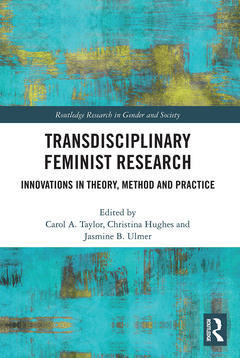Transdisciplinary Feminist Research Innovations in Theory, Method and Practice Routledge Research in Gender and Society Series
Auteurs : Taylor Carol, Ulmer Jasmine, Hughes Christina

What is feminist transdisciplinary research? Why is it important? How do we do it? Through 19 contributions from leading international feminist scholars, this book provides new insights into activating transdisciplinary feminist theories, methods and practices in original, creative and exciting ways ? ways that make a difference both to what research is and does, and to what counts as knowledge. The contributors draw on their own original research and engage an impressive array of contemporary theorising ? including new materialism, decolonialism, critical disability studies, historical analyses, Black, Indigenous and Latina Feminisms, queer feminisms, Womanist Methodologies, trans studies, arts-based research, philosophy, spirituality, science studies and sports studies ? to trouble traditional conceptions of research, method and praxis. The authors show how working beyond disciplinary boundaries, and integrating insights from different disciplines to produce new knowledge, can prompt important new transdisciplinarity thinking and activism in relation to ongoing feminist concerns about knowledge, power and gender. In doing so, the book attends to the multiple lineages of feminist theory and practice and seeks to bring these historical differences and intersections into play with current changes, challenges and opportunities in feminism. The book?s practically-grounded examples and wide-ranging theoretical orbit are likely to make it an invaluable resource for established scholars and emerging researchers in the social sciences, arts, humanities, education and beyond.
1.Introduction 2.Walking as trans(disciplinary)mattering: A speculative musing on acts of feminist indiscipline 3.Critical disability studies and the problem of method 4.Historical interludes: The productive uncertainty of feminist transdisciplinarity 5.Powerful dressing: Artfully challenging sexism in the academy 6.Listening to water: Situated dialogues between Black, Indigenous and Black-Indigenous feminisms 7.The bathroom polemic: Addressing the ethical and political significance of transgender informed epistemologies for feminist transdisciplinary inquiry 8.Performance practice and eco-feminism: A diffractive approach for a transdisciplinary pedagogy 9.Living in the hyphens: Between a here, a there, and an elsewhere 10.Caster Semenya: The surveillance of sportswomen’s bodies, feminism and transdisciplinary research 11.Womanist and Chicana/Latina feminist methodologies: Contemplations on the spiritual dimensions of research 12.Hear me roar: Sound feminisms and qualitative methodologies 13.Inter(r)uptions: Reimagining dialogue, justice, and healing 14.Moving with the folds of time and place: exploring gut reactions in speculative transdisciplinary research with teen girls’ in a post-industrial community 15.Transition states: Chemistry educators engaging with and being challenged by matter, materiality and what may come to be 16.Embodying critical arts-based research: Complicating thought/thot leaders through transdisciplinary discourse 17.(Un)disciplined: What is the terrain of my thinking? 18.Sex: A transdisciplinary concept 19.Conclusion: The rusty futures of transdisciplinary feminism
Carol A. Taylor is Professor of Higher Education and Gender, and Director of Research (Department of Education) at the University of Bath. Carol’s research focuses on the entangled relations of knowledge–power–gender–space–ethics, and utilises feminist, new materialist and posthumanist theories and methodologies to explore gendered inequalities, spatial practices and staff and students’ participation in a range of higher education sites. Her latest co-edited books are Posthumanism and Higher Education: Reimagining Pedagogy, Practice and Research (2019, with A. Bayley), and Gender in Learning and Teaching: Feminist Dialogues across International Boundaries (2019, with A. Abbas and C. Amade-Escot). Carol is co-editor of the journal Gender and Education and serves on the Editorial Boards of Teaching in Higher Education and Critical Studies in Teaching and Learning. Carol’s work is widely published in international journals.
Christina Hughes is Professor of Women and Gender Studies and has worked at the Universities of Warwick, Sheffield Hallam and Kent. She is a Visiting Professor at the University of Coventry. Her research career began with a participant observation study of stepfamilies and has included issues related to employment, career and education. She also has longstanding interests in research methodologies. Her edited books include Researching Gender (2013), Posthuman Research Practices in Education (2016, with Carol A. Taylor), and International Perspectives of Learning Gain (2020, with Malcolm Tight).
Jasmine B. Ulmer, PhD, is Assistant Professor at Wayne State University in Detroit. Within the College of Education, she teaches and directs the doctoral track in qualitative inquiry. Her programme of research develops inclusive inquiry methodologies and pedagogies. She locates her work at the intersection of qualitative
Date de parution : 04-2022
15.6x23.4 cm
Date de parution : 07-2020
15.6x23.4 cm
Thème de Transdisciplinary Feminist Research :
Mots-clés :
Material Feminist Theories; Caster Semenya; transdisciplinary; Chicana Feminist; feminist research; Cogenerative Dialogues; theory; Violated; method; Trans Women; practice; Disengaging; feminist methodology; Transdisciplinary Concept; reflexivity; Clip; disability studies; Power Dressing; decolonial transnational feminism; Discursive Practices; sexism; Material Discursive Practices; black feminism; Van Der Tuin; indigenous feminism; Bathroom Signage; Latina feminism; ecofeminist pedagogy; Material Feminism; life support; Worn Gloves; spiritual dimensions of research; Chicana Feminism; feminist discourse; Honest Accountability; corporeal cosmopolitanism; Michigan Women’s Music Festival; queer dialogue; Hip Hop Feminist; international feminist scholars; Trans People; humanities; feminist transdisciplinary research; QR Code; feminist theory; Critical Race Feminism; spirituality
